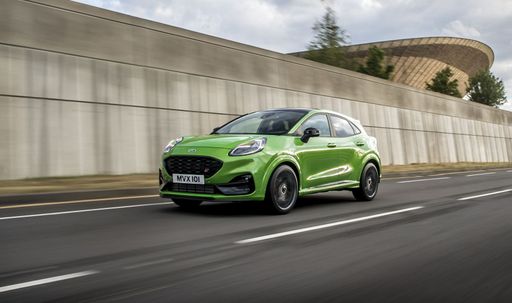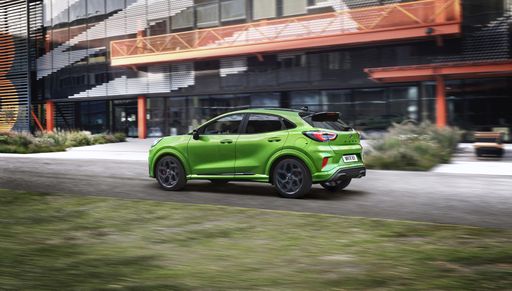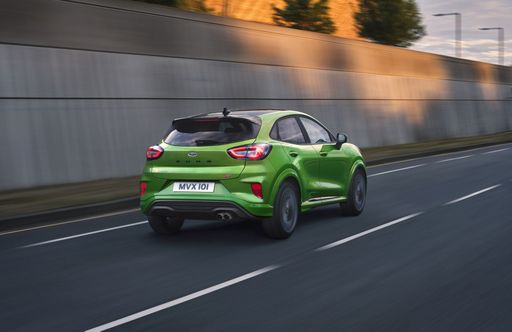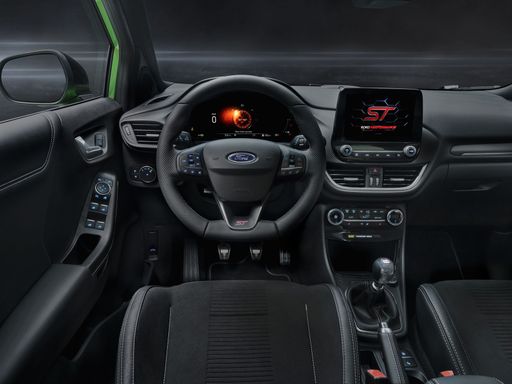Ford Puma vs Mitsubishi Colt - Differences and prices compared
Costs and Efficiency:
Price and efficiency are often the first things buyers look at. Here it becomes clear which model has the long-term edge – whether at the pump, the plug, or in purchase price.
Mitsubishi Colt has a distinct advantage in terms of price – it starts at 18200 £, while the Ford Puma costs 24800 £. That’s a price difference of around 6609 £.
Fuel consumption also shows a difference: Mitsubishi Colt manages with 4.20 L and is therefore noticeable more efficient than the Ford Puma with 5.40 L. The difference is about 1.20 L per 100 km.
Engine and Performance:
Power, torque and acceleration are the classic benchmarks for car enthusiasts – and here, some clear differences start to show.
When it comes to engine power, the Ford Puma has a to a small extent edge – offering 168 HP compared to 143 HP. That’s roughly 25 HP more horsepower.
In acceleration from 0 to 100 km/h, the Ford Puma is distinct quicker – completing the sprint in 7.40 s, while the Mitsubishi Colt takes 9.30 s. That’s about 1.90 s faster.
In terms of top speed, the Ford Puma performs slightly better – reaching 210 km/h, while the Mitsubishi Colt tops out at 174 km/h. The difference is around 36 km/h.
There’s also a difference in torque: Ford Puma pulls convincingly stronger with 290 Nm compared to 160 Nm. That’s about 130 Nm difference.
Space and Everyday Use:
Cabin size, boot volume and payload all play a role in everyday practicality. Here, comfort and flexibility make the difference.
Seats: offers more seating capacity – vs .
In curb weight, Mitsubishi Colt is slightly lighter – 1189 kg compared to 1316 kg. The difference is around 127 kg.
In terms of boot space, the Ford Puma offers distinct more room – 523 L compared to 391 L. That’s a difference of about 132 L.
In maximum load capacity, the Ford Puma performs a bit better – up to 1283 L, which is about 214 L more than the Mitsubishi Colt.
When it comes to payload, Ford Puma a bit takes the win – 469 kg compared to 385 kg. That’s a difference of about 84 kg.
Who wins the race?
The Ford Puma proves to be outperforms in nearly all aspects and therefore becomes our DriveDuel Champion!
Ford Puma is the better all-rounder in this comparison.
 @ Ford Motor Company / Ford Media Center
@ Ford Motor Company / Ford Media Center
Ford Puma
Costs and Consumption
View detailed analysis
Engine and Performance
View detailed analysis
Dimensions and Body
View detailed analysis
Ford Puma
The Ford Puma is a cheeky compact crossover that blends sporty styling with city-friendly practicality, giving drivers a surprisingly fun and composed ride. With clever storage tricks and a lively personality, it’s a smart pick for buyers who want enjoyment without fuss.
details @ Ford Motor Company / Ford Media Center
@ Ford Motor Company / Ford Media Center
 @ Ford Motor Company / Ford Media Center
@ Ford Motor Company / Ford Media Center
 @ Ford Motor Company / Ford Media Center
@ Ford Motor Company / Ford Media Center
 @ Ford Motor Company / Ford Media Center
@ Ford Motor Company / Ford Media Center
Mitsubishi Colt
The Mitsubishi Colt is a compact city hatch that blends sensible practicality with cheeky, no-nonsense styling, making it a confident companion for tight streets and daily errands. It may not be a playground for driving purists, but its easy-to-live-with manners, modest running costs and surprisingly roomy cabin make it a smart, sensible pick for urban buyers who value reliability over showmanship.
details
 @ Ford Motor Company / Ford Media Center
@ Ford Motor Company / Ford Media Center
|
|
|
|
|
Costs and Consumption |
|
|---|---|
|
Price
24800 - 36300 £
|
Price
18200 - 25000 £
|
|
Consumption L/100km
5.4 - 5.9 L
|
Consumption L/100km
4.2 - 5.3 L
|
|
Consumption kWh/100km
13.1 - 13.9 kWh
|
Consumption kWh/100km
-
|
|
Electric Range
361 - 376 km
|
Electric Range
-
|
|
Battery Capacity
43 kWh
|
Battery Capacity
-
|
|
co2
0 - 135 g/km
|
co2
96 - 119 g/km
|
|
Fuel tank capacity
42 L
|
Fuel tank capacity
39 - 42 L
|
Dimensions and Body |
|
|---|---|
|
Body Type
SUV
|
Body Type
Hatchback
|
|
Seats
5
|
Seats
5
|
|
Doors
5
|
Doors
5
|
|
Curb weight
1316 - 1563 kg
|
Curb weight
1189 - 1380 kg
|
|
Trunk capacity
456 - 523 L
|
Trunk capacity
301 - 391 L
|
|
Length
4186 - 4226 mm
|
Length
4053 mm
|
|
Width
1805 mm
|
Width
1798 mm
|
|
Height
1550 - 1555 mm
|
Height
1439 mm
|
|
Max trunk capacity
1216 - 1283 L
|
Max trunk capacity
979 - 1069 L
|
|
Payload
367 - 469 kg
|
Payload
381 - 385 kg
|
Engine and Performance |
|
|---|---|
|
Engine Type
Electric, Petrol MHEV
|
Engine Type
Petrol, Full Hybrid
|
|
Transmission
Automatic, Manuel
|
Transmission
Manuel, Automatic
|
|
Transmission Detail
Reduction Gearbox, Manual Gearbox, Dual-Clutch Automatic
|
Transmission Detail
Manual Gearbox, Automatic Gearbox
|
|
Drive Type
Front-Wheel Drive
|
Drive Type
Front-Wheel Drive
|
|
Power HP
125 - 168 HP
|
Power HP
91 - 143 HP
|
|
Acceleration 0-100km/h
7.4 - 9.8 s
|
Acceleration 0-100km/h
9.3 - 12.2 s
|
|
Max Speed
160 - 210 km/h
|
Max Speed
174 km/h
|
|
Torque
170 - 290 Nm
|
Torque
148 - 160 Nm
|
|
Number of Cylinders
3
|
Number of Cylinders
3 - 4
|
|
Power kW
92 - 124 kW
|
Power kW
67 - 105 kW
|
|
Engine capacity
999 cm3
|
Engine capacity
999 - 1598 cm3
|
General |
|
|---|---|
|
Model Year
2025
|
Model Year
2023 - 2025
|
|
CO2 Efficiency Class
A, D
|
CO2 Efficiency Class
D, C
|
|
Brand
Ford
|
Brand
Mitsubishi
|
Is the Ford Puma offered with different drivetrains?
The Ford Puma is offered with Front-Wheel Drive.
The prices and data displayed are estimates based on German list prices and may vary by country. This information is not legally binding.
